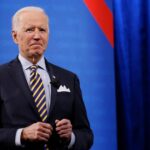Mark Gbillah, a former member of the House of Representatives and the ex-Chairman of the investigating committee for crude oil theft, once raised a significant concern regarding the transparency of government proceedings. Representing the Gwer East/Gwer West Federal constituency of Benue State in the 9th Assembly, Gbillah had always been a vocal advocate for accountability.
In a notable instance, Gbillah demanded that lawmakers should publish and make public the outcome of the House of Representatives’ investigation into the faulty presidential jet. His call for transparency came during an appearance on a Channels TV program, where he expressed his concerns over the possible causes of the jet’s issues, suggesting that a lack of maintenance could be at fault, even though the aircraft’s lifespan was still within the allowable limit.
He said, “I would encourage the National Assembly to make it public. Every decision concerning this issue should be made public.”
Gbillah stressed the importance of involving aviation experts to assess the situation accurately, ensuring that the presidential fleet remained in good flying condition through proper maintenance and necessary repairs.
Reflecting on the broader implications of the government’s actions, Gbillah argued that it was not appropriate for the Nigerian government to purchase a new presidential jet during a period of worsening living conditions for the populace. He emphasized the need for fiscal responsibility and sensitivity to the nation’s economic challenges.
He said, “If there has been an investigation about what transpired with regards to the aircraft, it should be made public. We have professionals replete in this aviation sector with knowledge about the industry.”
Gbillah pointed out that the incident involving the presidential jet, which had prevented the President from flying to Saudi Arabia after a trip to Paris, might not necessarily indicate a fundamental issue with the plane. Instead, he suggested it could have been due to oversight or insufficient maintenance, rather than a justification for procuring a new aircraft.
“It might have been an oversight on somebody’s part. It might have been a lack of maintenance. I do not think this is a time to be procuring new aircraft, that is being insensitive,” he remarked.
Gbillah’s call for transparency and prudent spending resonated with many who shared his concern for the nation’s welfare and the responsible use of public resources.


